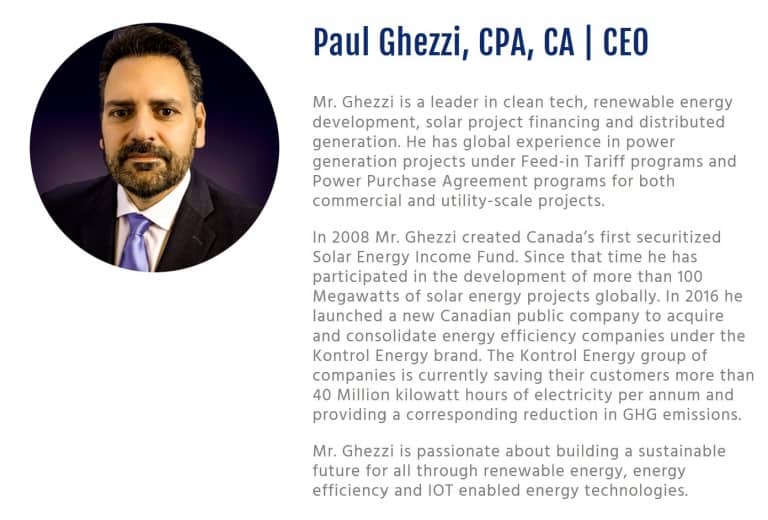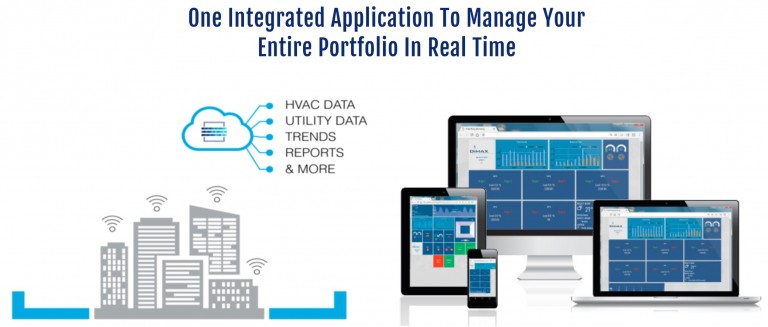Sophic Capital is pleased to introduce you to our new client Kontrol Energy (KNR-CSE; KNRLF-OTC).
Kontrol Energy makes buildings smarter in real-time. Smarter buildings are more profitable, valuable, and sustainable. Led by a management team with 60 years of experience, a previous exit, and about 45% insider ownership, we believe this is a company that will appeal to investors interested in SaaS, Cloud, IOT and ESG.
We recently chatted with CEO Paul Ghezzi; this is a brief summary of what he had to say:
Q. Paul, tell us more about the problem that Kontrol Energy solves?
A. Ask people what the biggest emitter of greenhouse gases (“GHG”) is, and they’ll likely say “cars”. Actually, buildings generate approximately 40% of these gases. Buildings also waste about 30% of the energy they consume. Combined, these wastes costs building owners about $100 billion annually. The reason is that most buildings have no intelligence to monitor and manage energy consumption or greenhouse gases. We provide that intelligence in real-time.
Q. How do you provide that intelligence?
A. We are primarily software-as-a-service / cloud provider. Our solution collects and analyzes real-time data collected from a building’s mechanical, electrical, utilities, and environmental systems to increase their operational efficiencies and reduce energy waste while optimizing operating efficiencies. Our software includes learning algorithms that make our solutions smarter over time.
Q. Do you provide the hardware to collect that data?
A. Yes. We have our SmartMax Gateway and smart learning automation devices that collect, analyze, and optimize building operations in real-time. Our solution is non-invasive to buildings and data is collected wirelessly.
Q. So, tell us about your revenue model.
A. We have three revenue streams: SaaS revenue is predictable recurring revenue that each customer pays regularly. Service revenue is also recurring revenue. And we have retrofit revenue where we define a project and sometimes install hardware and the software. Of the $14.5 million of revenue we reported in 2019, about $4 Million was recurring, $7 Million was repeat business and $3 million was new projects that we didn’t have at the beginning of the year.
Q. And Kontrol Energy was also EBITDA positive in 2019.
A. Yes. We reported $0.5 million of adjusted EBITDA for 2019 and $240,000 in our first quarter of 2020. Part of the reason is that SaaS and service revenues have high margins. Another reason is that existing customers typically expand their deployments after our solutions demonstrate their cost savings. For them, paybacks are usually under three years. For us, customer expansion requires far less expense than landing new customers.
Q. Your “land and expand” seems to be working with Toyota. Tell us about that customer.
A. I’ll start by saying we have a great customer base overall. We met Toyota Tsuho Canada while on a different deployment. They have a long-term initiative to reduce energy consumption and greenhouse gas emissions globally. We signed a major deal with Toyota in March 2019 to form a joint venture providing technology solutions and services to OEMs in the automotive sector to optimize production and manage energy in real-time. We received our first order with Toyota Tsusho last September and have since expanded to 5 facilities and growing.
Q. What is the size of your Toyota opportunity?
A. Right now, we have about 200 facilities in our Toyota pipeline. We believe that each facility has the potential to generate $150K in annual recurring revenue and are targeting to go from 8 facilities today to 100 by the end of 2023.
Q. Toyota is a big validation of Kontrol Solutions. You have real products that are being used by a major global brand (Toyota). Can you tell us who some of your other customers are?
A. We have a broad customer base but some of our more well-known customers are Beyond Meat, Suncor Energy, Oxford, Greenwin, and Brookfield.
Q. How has the coronavirus pandemic affected your pipeline?
A. We were still busy. Obviously, some of our automation projects were delayed but we continued to issue several proposals. And many customers have praised our solution because many jurisdictions issued closure orders that closed a lot of buildings. Yet because we provide data and analytics via SaaS, our clients could still monitor their buildings across their portfolios. While revenues are slightly lower we have been able to adjust expenses to maintain profitability.
Q. Let’s move to your balance sheet. You have a clean cap table and tight share structure.
A. Yes. As of March 31, 2020, the end of our first quarter of 2020, we had 29.8 million shares, 3.0 million options at a $0.74 weighted average price, and 2.7 million warrants priced at $0.80 that mature April 25, 2021.
Q. And you’re refinancing some debentures?
A. Yes. We have a non-brokered private placement for up to $5.8 million, unsecured debentures that pay 8% and will be first offered to existing debenture holders. Each unit comes with 50 common shares. This represents a re-financing and extension of existing debentures and we are anticipating the closing in October 2020. As the debentures move from current to long term obligation it will provide a significant balance sheet improvement.
Q. How can investors get more info on Kontrol Energy?
A. Investors interested in learning more can go to our website www.KontrolEnergy.com where we have a lot more material about the business, management and our solutions and/or contact Sophic Capital if you would like more information.



